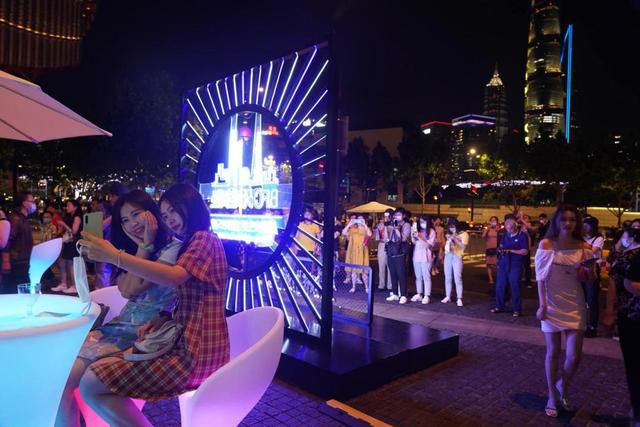

Many Chinese cities have rolled out cultural and tourism activities to boost the nighttime economy, as COVID-19 prevention and control measures become regular and routine in the country.

Citizens enjoy themselves at the night festival in Shanghai. (Photo/China Daily)
East China's Shanghai kicked off a night festival on June 6, with over 180 themed activities like night tours, shopping, dining and live shows, including activities launched by cultural venues.
Over 40 museums and art galleries will extend business hours and launch special nighttime exhibitions, lectures and exploration activities, according to statistics from the Shanghai Municipal Administration of Culture and Tourism.
Suzhou, in east China's Jiangsu province, also launched a museum-themed nighttime event on the same day. According to the plan, museums in the city, including the Suzhou Museum, Suzhou Museum of Opera and Theatre, and Suzhou Silk Museum, will extend business hours each Friday and Saturday in June.
Extending business hours means that museums and art galleries should launch more evening cultural activities, said He Jianmin with the College of Business of the Shanghai University of Finance and Economics.
The northern Chinese port city of Tianjin recently issued a notice to develop the nighttime economy, aiming to build a diversified late-night consumption market that covers industries such as catering, tourism and entertainment.
South China's Guangdong province also announced plans to develop nighttime economy featuring culture and tourism by encouraging major business areas to organize cultural, tourism and leisure activities with extended business hours. The province will also hold more nighttime theatrical performances and encourage museums to open to the public at night.
Data from Ctrip Group, a Chinese online travel agency, showed that relevant night performance programs have been restarted across the country, including those in Guangzhou, Xi'an, Sanya, Hangzhou and Zhengzhou. Statistics from some cities also revealed that night tours have helped boost the gradual recovery of the local evening tourism economy, as well as cultural and tourism spending.
According to data from several internet platforms, cultural and tourism spending is playing a bigger role in the development of nighttime economy.
Dai Bing, head of the China Tourism Academy, said nighttime economy can meet the ever-growing material and cultural needs of the people, allowing tourists at home and abroad to experience the local culture and ways of life.
To develop the nighttime economy, local governments should fully tap into the local nighttime leisure resources, venues and programs, while creating leisure and entertainment programs with local cultural characteristics, Dai added.
 Fire brigade in Shanghai holds group wedding
Fire brigade in Shanghai holds group wedding Tourists enjoy ice sculptures in Datan Town, north China
Tourists enjoy ice sculptures in Datan Town, north China Sunset scenery of Dayan Pagoda in Xi'an
Sunset scenery of Dayan Pagoda in Xi'an Tourists have fun at scenic spot in Nanlong Town, NW China
Tourists have fun at scenic spot in Nanlong Town, NW China Harbin attracts tourists by making best use of ice in winter
Harbin attracts tourists by making best use of ice in winter In pics: FIS Alpine Ski Women's World Cup Slalom
In pics: FIS Alpine Ski Women's World Cup Slalom Black-necked cranes rest at reservoir in Lhunzhub County, Lhasa
Black-necked cranes rest at reservoir in Lhunzhub County, Lhasa China's FAST telescope will be available to foreign scientists in April
China's FAST telescope will be available to foreign scientists in April "She power" plays indispensable role in poverty alleviation
"She power" plays indispensable role in poverty alleviation Top 10 world news events of People's Daily in 2020
Top 10 world news events of People's Daily in 2020 Top 10 China news events of People's Daily in 2020
Top 10 China news events of People's Daily in 2020 Top 10 media buzzwords of 2020
Top 10 media buzzwords of 2020 Year-ender:10 major tourism stories of 2020
Year-ender:10 major tourism stories of 2020 No interference in Venezuelan issues
No interference in Venezuelan issues
 Biz prepares for trade spat
Biz prepares for trade spat
 Broadcasting Continent
Broadcasting Continent Australia wins Chinese CEOs as US loses
Australia wins Chinese CEOs as US loses